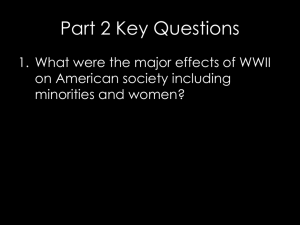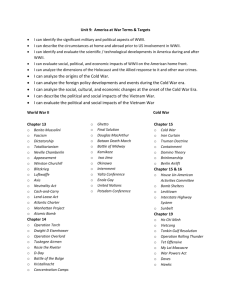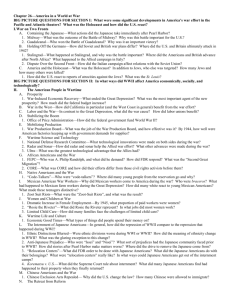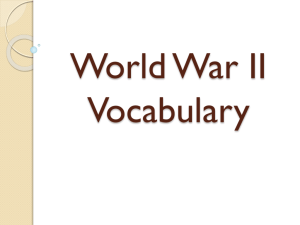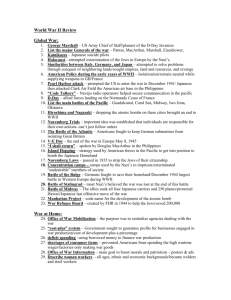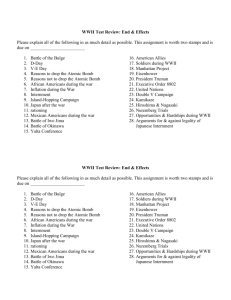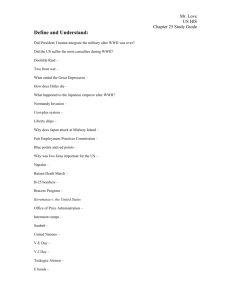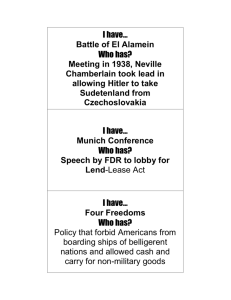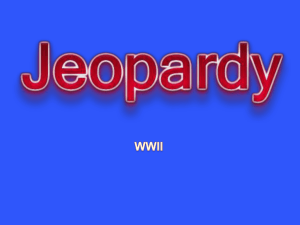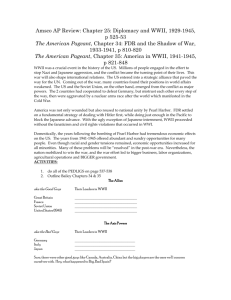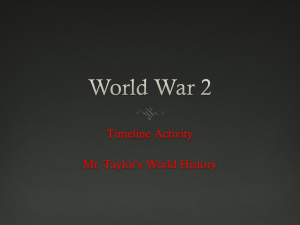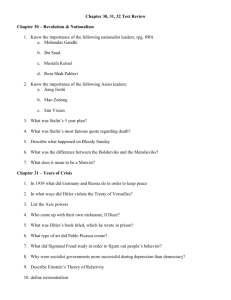APUSH Unit 6: Interwar Period & WWII Syllabus
advertisement
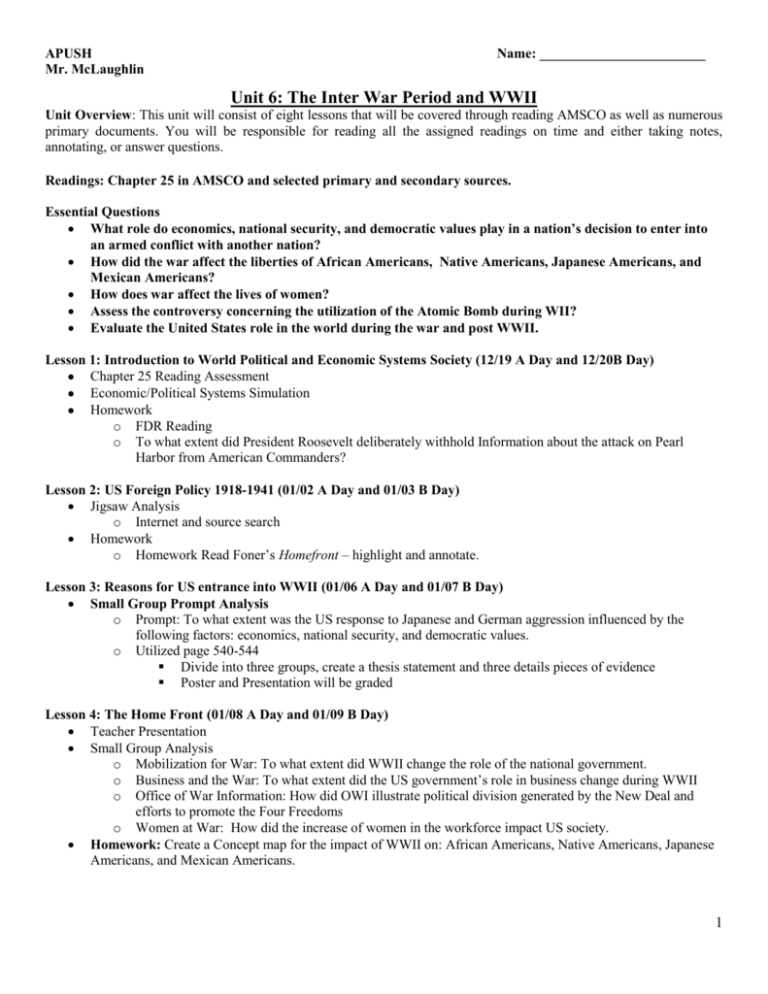
APUSH Mr. McLaughlin Name: ________________________ Unit 6: The Inter War Period and WWII Unit Overview: This unit will consist of eight lessons that will be covered through reading AMSCO as well as numerous primary documents. You will be responsible for reading all the assigned readings on time and either taking notes, annotating, or answer questions. Readings: Chapter 25 in AMSCO and selected primary and secondary sources. Essential Questions What role do economics, national security, and democratic values play in a nation’s decision to enter into an armed conflict with another nation? How did the war affect the liberties of African Americans, Native Americans, Japanese Americans, and Mexican Americans? How does war affect the lives of women? Assess the controversy concerning the utilization of the Atomic Bomb during WII? Evaluate the United States role in the world during the war and post WWII. Lesson 1: Introduction to World Political and Economic Systems Society (12/19 A Day and 12/20B Day) Chapter 25 Reading Assessment Economic/Political Systems Simulation Homework o FDR Reading o To what extent did President Roosevelt deliberately withhold Information about the attack on Pearl Harbor from American Commanders? Lesson 2: US Foreign Policy 1918-1941 (01/02 A Day and 01/03 B Day) Jigsaw Analysis o Internet and source search Homework o Homework Read Foner’s Homefront – highlight and annotate. Lesson 3: Reasons for US entrance into WWII (01/06 A Day and 01/07 B Day) Small Group Prompt Analysis o Prompt: To what extent was the US response to Japanese and German aggression influenced by the following factors: economics, national security, and democratic values. o Utilized page 540-544 Divide into three groups, create a thesis statement and three details pieces of evidence Poster and Presentation will be graded Lesson 4: The Home Front (01/08 A Day and 01/09 B Day) Teacher Presentation Small Group Analysis o Mobilization for War: To what extent did WWII change the role of the national government. o Business and the War: To what extent did the US government’s role in business change during WWII o Office of War Information: How did OWI illustrate political division generated by the New Deal and efforts to promote the Four Freedoms o Women at War: How did the increase of women in the workforce impact US society. Homework: Create a Concept map for the impact of WWII on: African Americans, Native Americans, Japanese Americans, and Mexican Americans. 1 Lesson 5: The Home Front Continued (01/10 A Day and 01/13 B Day) Analyzing the Concept Map o How did the war affect the liberties of African Americans, Native Americans, Mexican Americans and Japanese Americans Civil Rights During Wartime o Individual US Amendments Rights and Activity How has the United States historically balanced civil liberties and national security? Read and discuss the essential question o Small Group Japanese American Internment Activity o Class Discussion Japanese Interment Small group discussions and analysis Lesson 6: Mr. McLaughlin’s Philippines Presentation and the Decision to Drop the Bomb (01/14 A Day and 01/15 B Day) Power Point Presentation and Graphic Organizer Primary Source Document Activity (The Decision to Drop the Bomb) Homework: Read and annotate the WWII Conference Materials Packet Lesson 7: World War II conferences (01/16 A Day and 01/17 B Day) Conference Analysis Lesson Lesson 8: WWII Assessment – Multiple choice and DBQ (01/21 A Day and 01/22 B Day) Key People, Events, and Terms 1. 2. 3. 4. 5. 6. 7. 8. 9. 10. 11. 12. 13. 14. 15. 16. 17. 18. 19. 20. 21. 22. 23. 24. Adolf Hitler America First Committee Appeasement Atlantic Charter Atomic Bomb Axis Powers Battle of Midway Battle of Iwo Jima Battle of the Atlantic Battle of the Bulge Benito Mussolini Big Three Blitzkrieg Casablanca Conference Chester Nimitz Concentration Camps Cordell Hull Czechoslovakia D-Day Destroyers for bases deal Douglas MacArthur Dwight Eisenhower Emperor Hirohito Ethiopia 25. Fascism 26. Federal Employment Practices Commission 27. Four Freedoms Speech 28. Francisco Franco 29. Genocide 30. German Nazi Party 31. Great Migration 32. General Tojo 33. Harry S. Truman 34. Hiroshima; Nagasaki 35. Holocaust 36. Island Hopping 37. Isolationism 38. Italian Fascist Party 39. J. Robert Oppenheimer 40. Japanese Internment Camps 41. Josef Stalin 42. Korematsu v. U.S. 43. Lend Lease Act (1941) 44. Manchuria (Manchukuo) 45. Manhattan Project 46. Neutrality Acts 47. Nuremberg and Tokyo Trials 48. Nye Committee 49. Office of Price Administration 50. Office of War Administration 51. Operation Overlord 52. Pearl Harbor 53. Poland 54. Potsdam Conference 55. Quarantine Speech 56. Rhineland 57. Selective Training & Service Act (1940) 58. Smith v. Allwright 59. Sudetenland 60. Tehran Conference 61. Totalitarianism 62. United Nations 63. Vichy France 64. Wendell Willkie 65. Winston Churchill 66. Yalta Conference 2 Recommended Books - Exodus by Leon Uris - Ghost Soldiers by Hampton Sides - Hunting Eichmann by Neal Bascomb 3
